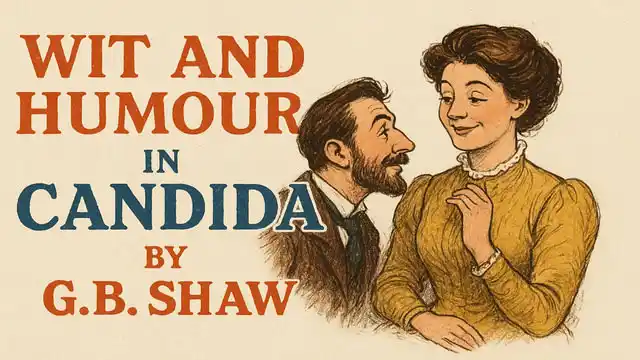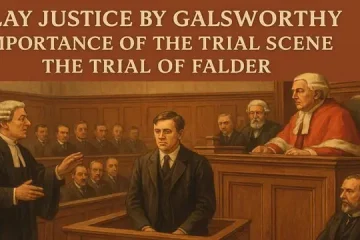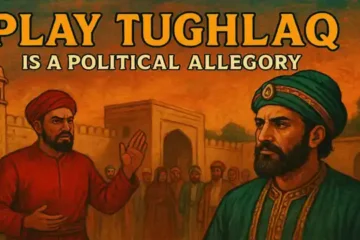Shaw’s wit and humour in Candida:
George Bernard Shaw’s “Candida” (1898) is a play that sparkles with the playwright’s characteristic wit and humour, which he uses not merely for entertainment but as a vehicle for social and intellectual criticism. Shaw’s humour is never frivolous; it is pointed, ironic, and often paradoxical, exposing the hypocrisies of conventional morality, marriage, and gender roles.
The play’s comedy arises as much from verbal duels and epigrams as from the situations Shaw creates—for instance, the love triangle between the energetic clergyman James Morell, his wife Candida, and the idealistic young poet Marchbanks.
Shaw’s wit turns serious themes into lively debates, blending satire with laughter so that audiences are amused even as they are challenged to rethink accepted notions of love, strength, and “possession” in relationships. In this way, the humour of “Candida” is inseparable from its intellectual depth, making the play both entertaining and thought-provoking.
Shaw’s Wit, an Expression of His Intellectual Judgement in Life:
Shaw’s principal factor is his wit. What draws people irresistibly to the theatres where his works are performed in the well – known circumstance that though he talks about such abstruse matters as the economic reorganisation of mankind, or even one complete suppression by an entirely new race of beings hardly more subject to human weakness than is Mr. Shaw himself, yet he convulses his audiences in laughter more uproarious than is promoted by any force.
The fact is that, Shaw’s intellectual consciousness brings home to him the ridiculous irrationality of human beings, and rouses in him the spirit of satire. In the expression of this, his wit becomes scorching, devastating, distressing and man becomes a pitiful weakling, floundering in the quagmire of unreasoning and making an ass of himself.
Indeed, Shaw has often been regarded as a mere wit, and not a humorist or a comedian in the true senses other the word. Shaw is such a brilliant talker, and there is so much of smart wit in his dramas that many have thought there is nothing else. In the words of C. E. M. Joad: “His wit is not a mere ornament tacked onto a negligible structure of thought, it is the very bones and sinew of the thought.” His witty remarks are pellets of thought rather than gems of wit.
Shaw is never witty for the sake of being witty. He makes jokes, epigrams and aphorisms in order to startle and capture attention. His wit is an expression of his intellectual judgement on life. It is the handmaid of his philosophy, an instrument of his social purpose.
Wit in Candida:
Candida is so full of wit that at times it becomes difficult to find anything else. The crisp dialogues which Shaw creates are responsible for this. He expresses his intellectual judgement through them. All the prevailing institutions of marriage, family, economic structure and moral code have received a crushing thrashing at his hands. Right in the beginning of the play, Morell is invited to address the Hoxton Freedom Group. Not a single day is vacant when Morell can go to address them. Proserpine asks him not to go saying that they are only half a dozen ignorant and conceited costermongers. This brings out a very witty remark from Morell.
Morell: Proserpine Ah; but you see they are near relatives of mine.
Proserpine: Relatives of yours!
Morell: Yes we have the same father in Heaven.
There is wit in the manner in which Morell blames Burgess and gets at report.
Morell: Your exact words then were “just as big a fool as ever. James”!
Burgess: I meant no hoffence by it. A clorgyman is privileged to be a bit of fool, you know.
Morell is quite proud of his happy domestic life. He asks Eugene to see for himself how happy his married life is. The witty reaction that Eugene makes shatters the castle of Morell’s happiness.
Morell: I should like you to see for yourself what a happy thing it is to be married as I am.
Marchbanks: Happy! your marriage! you think that! you believe that!
We find a good example of piercing wit in Marchbanks’ dialogues when he lies down with his head in Candida’s lap. He says:
“Oh, I’ve been so miserable all the evening, because I was doing right. Now I am doing wrong; and I’m happy.”
One of the capturing strokes of wit comes from the mouth of Eugene when Morell returns home after lecture. Morell enquires as to how he has conducted himself his absence, though he does not find proper words to do so:
Morell: Well?
Marchbanks: Well?
Morell: Haven’t you anything to tell me?
Marchbanks: Only that I have been making a fool of myself here in ich private whilst you have been making a fool of yourself in public.
Shaw, a True Humorist:
Wit is subordinated to Shaw’s comic – intentions. It is the instrument by which he exposes the incongruity of a host of human institutions, beliefs and conventions. In the words of a scholar and critic: “Shaw has the pure comic spirit which is joyous and optimistic. He does not start from a presumption of the evil in man, but from a profound belief in his essential goodness. He does not have a soured outlook on human affairs. Though impatient with men and his folly, his belief in the saving virtue of intellect prevents the intrusion of any bitterness in his comedy. This causes his work to possess a benevolence not always recognised, but invariably present, which make him as a comedy writer unique except for Shakespeare.” Shaw’s comic genius is honest, liberal, courageous and gay. His sense of the incongruities of life is so acute, and his humour so pervasive, that it penetrates even the tragic.
Want of Emotions and Sentiments:
Misconception about the true nature of Shaw’s comic genius also arises from the fact that his dramas are ‘dramas of ideas’ and true humour is not of the intellect but of emotion and sentiment. There is very little emotion in Shaw’s plays, but too much of intellectual judgement on life. He hates sentiments and tries to take an intelligent view of things. In the words of a scholar and critic: “Shaw never falls in love with creations: there is never a scarp of sadness in his writing.” Life for him is a big joke; there is not that large hearted tolerance in his comedies, which is inseparable from an emotional view of life.
Emotional sympathy with his creations is the test of a true humorist, but none of Shaw’s characters, with the possible exception of Jennifer, arouse any feeling of pathos. S. Gupta rightly points out that Shaw’s plays are often witty in form, but they are always humorous in substance. His humour, however, is different from that of both Dickens and Shakespeare. It is a humour arising not from the incongruities of character, but from the incongruities between instinctive conduct and social codes, conventions and institutions. This is his distinctive contribution to the concept of comic.
Humour employed in the Play Candida:
Shaw’s humour does not arise from a sense of sympathy with man. It is an acute sense of the ridiculous difference between man’s principles and profession, of the unconscious hypocrisy of human nature that is so laughably exposed in the real affairs of life, of the unconscious unreason that leads our conscious actions. In the present play, Candida, Shaw has employed a plenty of humour that enlivens the play and makes it worth reading. Humour is affected either through the agency of characters or situations or both. In Candida humour is produced by characters as well as situations.
Humour produced by Presenting Humorous Characters:
Some of the characters in Candida are quite humorous. Burgess’ flattering, and grinning, evokes laughter. His strange accent creates laughter. He, while speaking, uses the words ‘hemploy’, ‘hemployer’, ‘hexpect’, ‘puttin’, ‘workin’, ‘wishin’, for employ, employer, expect, putting, working, wishing. Again, Lexy’s manner of walking, speaking and imitating is very humorous. Imitating Morell, he puts his umbrella under his left arm instead of carrying it – in his hand like someone else. He says ‘knoaledge’ in church, though he always says ‘knolledge’ in private conversations.
Next, Marchbanks is also a source of humour. His attire provokes laughter. He wears an old blue jacket, unbuttoned. Beneath it he wears a woollen lawn – tennis shirt. His trousers match his jacket. He prefers brown canvas shoes on his feet. This interesting and ludicrous contrast which his dress presents makes him appear strange and forces us to smile or to laugh.
Situations providing Humour:
There are many situations in the play which provide humour and make us laugh innocently. Burgess comes to meet his son – in – law. But Morell does not greet him. Burgess, under the expectation and desire of being friendly again, wants to shake hands with him, but he rejects his hand of friendship. But soon the tension withers away. Burgess tickles the vanity of Morell, and he foretells that James Morell will be appointed as a Bishop. To hear this, Morell is overwhelmed with joy and happiness and shakes hands with Burgess.
This is perhaps one of a number of humorous situations framed in the mould of Shaw’s imagination. Next, James Morell can greet Burgess at his house if he (Burgess) comes as a scoundrel, justifying his scoundrels, and proud of it. If he appears in any other form, Morell asks him to take his hat and go.
Burgess thinks for a moment and then sits down very modestly and courteously in the chair. This part of the play provides humour. When Morell hears Burgess’ request for a nice book from him to pass the time till the dinner is ready, Morell becomes quite humorous. It is well known to Morell that a nice book will have no meaning for Burgess as he is very little educated. He therefore, gives him an illustrated paper. He begins to read it, but actually he is more concerned with watching the pictures in the paper. This provides a lot of humour.
Humour produced from Dialogue:
In the play, Candida, a plenty of humour rises from the dialogues. The conversation between the following characters is very entertaining and humorous:
Proserpine: Well, you’ve altered the spacing.
Marchbanks: (earnestly). I assure you I didn’t. I didn’t indeed. I only turned a little wheel. It gave a sort of click.
Proserpine: Oh, now I understand. I suppose you thought it was a sort of barrel – organ. Nothing to do but turn the handle, and it would write a beautiful letter of love for you straight off, eh?
Next,
Morell: (boiling over). How dare you, sir, come here and offer to forgive me, and talk about your daughter, and—
Burgess: Heasy, James! heasy! heasy! Don’t git hnto a fluster about nothink.
Morell: Burgess: you dont want to come.
Burgess: Oh, dont put it like that, James. It’s only that it aint Sunday. you know.
Morell: I’m sorry. I thought you might like to be introduced to the chairman. He’s on the Works Committee of the Country Council, and has some influence in the matter of contracts [Burgess wakes up at once]. Youll come?
Burgess: [with enthusiasm] Cawrse I’ll come, James. Aint it awlus a pleasure to ear you!
Finally, it can be observed that Shaw is a great humorist, and his humour is varied and all pervasive. We find him laughing even in serious plays. However, he is a humorist with a serious purpose and mere frivolity is rare in his plays.




